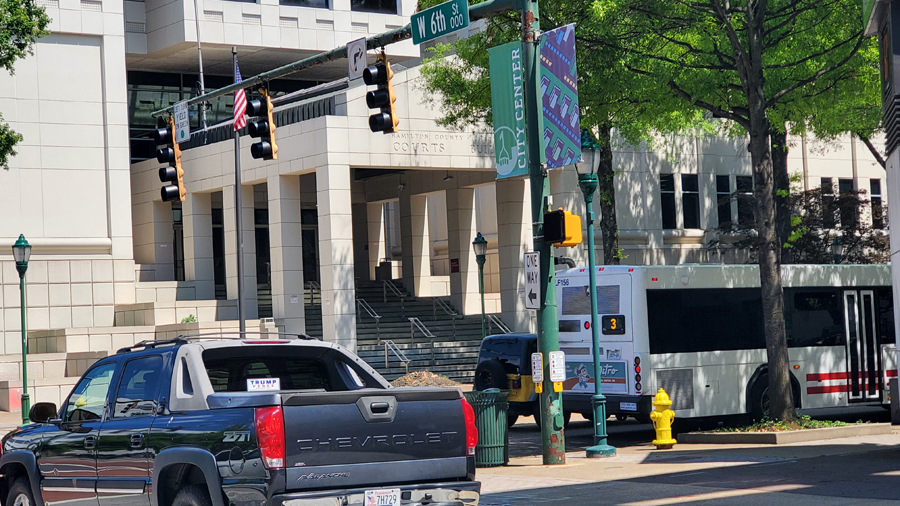
Ray Rzeplinski works at a house in which he is replacing a septic tank, but first having to order it drained. (Photo David Tulis)

The Rzeplinski “2A Ray” trial is being held in this Hamilton County monstrosity of a courthouse in on Market Street in Chattanooga starting July 30, 2024. (Photo David Tulis)
CHATTANOOGA, Tenn., Tuesday, July 22, 2024 — The Ray Rzeplinski trial set Monday in a 4-year-old revenge prosecution is an attack generally on due process, and arguably on each juror’s right of conscience to judge the facts and the law in “jury nullification.”
Among the irregularities in the prosecution brought by district attorney Coty Wamp is a bid to prevent jury member’s judging the case according to their own consciences and voiding erstwhile legal pretenses (law), according to arguments and statements made Monday at a motion hearing in Chattanooga in the criminal court of Judge Amanda Dunn.

Coty Wamp is district attorney in Hamilton County (Photo Coty Wamp)
Lawyerly processes and judicial conduct seem united to avoid having a revolted jury throw the tumor out onto Market Street, throbbing, stinking and oozing as it is, with charge stacking behind it so foul that Mr. Rzeplinski faces 1,270 years in prison because he didn’t cop a plea.
Ray Rzeplinski has been charged in a 57-count indictment that was reissued nearly 4 years into the case after he refused federal government pressure to plea bargain with Coty Wamp’s office and admit he is a “felon in possession” of a gun collection.
For not pleading guilty against his conscience and his own person, he faces a death sentence of life behind bars. Miss Wamp charges him with one felony count per weapon seized from Mr. Rzeplinski’s house on Banks Road in Hixson, with more than 1 million rounds of ammunition, all investments from a profitable small plumbing business in which he lives out a life of hard work and honorable dealings with all customers.
Best defense may not be front, center
Court-appointed attorney Ben McGowan may not exploit fully the only defense that appears likely to succeed, and that is the reliance defense. His reference to a “nonviolent felon like Mr. Rzeplinski” shows he concedes the nomenclature of “felon” to the other side, and refuses to see the case from his client’s perspective.
Miss Wamp’s lawyer on the case, Nicole Evans, insists burglary — the underlying alleged felony out of the defendant’s past — is “a crime of violence,” based on Tennessee law.
Because Mr. Rzeplinski has engaged a lawyer, he is trapped behind the forms and limitations lawyers bring in any criminal matter. Mr. McGowan has written excellent briefs and motions with great erudition and insight into law in cases New York State Rifle & Pistol Association, Inc. v. Bruen, 597 U.S. 1 (2022) (“a little twilight zone-ish,” Mr. McGowan says), and United States v. Rahimi, 602 U.S. ___ (2024), decided June 21.
In a “felon in possession” case in which the underlying criminal history lacks violence, “Is it still viable after Rahimi?” Mr. McGowan asks.
What Mr. Rzeplinski is seeing is that when a lawyer is in charge, his options and control diminish as he gets closer to trial. The “reliance defense” under the lawyer’s stewardship is a defense that seems from this distance forgone in the course of pre-trial proceedings. With a lawyer in charge, orderly sequencing is important, and the attorney calculates what he can yield, and what he must insist on. Mr. McGowan appears not to be intending to center the case on the alibi of “I knew I wasn’t a felon.”
‘2A Ray’ ordeal is 4 years old: Read more
Mr. Rzeplinski’s main defense — his lack of mens rea, or guilty conscience — has been traded away. Mr. McGown’s oral pleadings Monday are erudite, theoretical, and abstract. Scratching out notes, it was hard for me to see a clear argument for dismissal, applying Bruen and Rahimi to the Chattanooga defendant.
“Every saint has a past, every sinner has a future,” Mr. McGowan says, citing Oscar Wilde.
Judicial convention, custom and usage control. If Mr. Rzeplinski sees hope vanishing, and not knowing his lawyer’s plan, he will stand up and object? Will he get into the record what he has long insisted in his real defense?
Will he accept “Shut up and sit down” when his life is at stake?
Judge Dunn will order him to sit down — and he won’t. A bailiff will aggressively move toward him to wrestle him into the swivel chair. Mr. McGown will express extreme agitation, stand up next to him, and turn to him, nearly grabbing him by the arm. They will tell him he cannot speak, cannot question a witness, cannot make any argument whatsoever because he is “represented” by a lawyer. He is, in other words, incompetent by presumption. You may testify as witness, they’ll say, but otherwise you must remain silent.
“Sir, do not attempt to disturb these proceedings.” They will try to force him to waive objections, and deny him basis of appeal on his objecting to abandonment of the reliance defense.

Ray Rzeplinski waits Monday, July 22, as his attorney, Ben McGowan, ducks to a floor below for another proceeding on the day of a last-hour motion hearing in his trial set for the following Monday. (Photo David Tulis)
Rely on constitution
The only way he can save himself if the lawyer lets him down is to insist on his rights under the constitution, and to object to the court railroading him in violation of his rights to be the principal and not his lawyer’s subject, and to speak in his defense.
Under the constitution, “2A Ray” is master in the case, Ben McGowan is servant.
Government tells Mr. Rzeplinski he’s at worst a misdemeanant:
➤ A handgun carry permit by the Tennessee department of safety and renewed at least once
➤ Purchases of firearms from retail outlets, each with a TBI background check
➤ A plumber’s license, which you cannot hold if you are a felon, he says
➤ Numerous contracts to work in government buildings, not allowed to a felon
➤ When he was in jail in Bradley County under a child support judgment, he was made a trustee immediately on entry, not something afforded to any felon. What does that 2005 jail record say about criminal status?
➤ A disputed SBR, short-barreled rifle, obtained in private sale by a police officer
What about other important facts? How come when DOS revoked his handgun carry permit he did not get a hearing under the UAPA, the uniform administrative procedures act? Why, before he got notice of revocation, was he “swatted” by Sheriff Jim Hammond deputies who beat him badly, breaking several ribs? The violence of two arrests in this case constitute a breach of due process.
All adding up to this: Government is estopped from prosecuting him because he has a clean record and he is being abused.
Every single record.

Nicole Evans, prosecutrix. (Photo Mincey law firm)
The handgun permit.
Jail records.
Purchase receipts.
Plumber’s license.
The only way he can make that defense is to insist on his right to address the court himself, and not necessarily merely as witness.
Due process violations
In 1995 one evening Mr. Rzeplinski was in a car used by three other young men who burgled a Bradley County store and stole smokes and crackers. With no attorney, he was indicted, had a no-jury trial, and was convicted for his role. He understood the case to have involved a lesser theft of property charge. The story may also have involved a plea bargain ending in misdemeanor. He’d been told the matter would not be on his record. He’d engaged a Chattanooga attorney on an expungement, too.
Troubles with the sheriiff’s office began when Mr. Rzeplinski’s ex-wife married a deputy. The vendetta ran smack into the plumber’s requests for HCSO help in massive thefts in his business on Middle Valley Road. Bradley County officials returned a “no file” response to requests about his record. Two HCSO employees went to the Cleveland, Tenn., archive, and found a disputed file proving the burglary was not a misdemeanor, but a felony (felony = crime with more than a year in prison).
Debated Monday is whether the petty theft was a “crime of violence,” and if that definition applies against his 2nd amendment right to bear arms.
It’s not clear what substance Mr. McGowan plans to offer in defense.
The only option Mr. Rzeplinski appears to have regarding his alibi is to assert his constitutional rights are paramount over customs and usages when lawyers control the process in “the way we do things here.”
‘Right to be heard by himself ’
Mr. Rzeplinski opts for a jury trial in confidence in the American public which is increasingly angered by government abuse, and willing to be skeptical, despite decades of public education and media propaganda on TV, radio and in print.
Will there be juror knowledgeable enough to reject the prosecution outright and overcome the lawyers’ and judge’s plan to suppress juror’s rights to dismiss use of the law in the case via jury nullification?
Mr. Rzeplinski’s “right to be heard” at trial doesn’t mean just taking the stand as fact witness. He controls the case and manages the case, with assistance of counsel. The right covers every part of the trial. Opening statements. Questioning witnesses. Argument.
The federal 6th amendment says “In all criminal prosecutions, the accused shall enjoy *** to have compulsory process for obtaining witnesses in his favor, and to have the assistance of counsel for his defense.”
Sect. 9 of the Tennessee bill of rights states, “That in all criminal prosecutions, the accused hath the right to be heard by himself and his counsel; to demand the nature and cause of the accusation against him, and to have a copy thereof, to meet the witnesses face to face, to have compulsory process for obtaining witnesses in his favor, and in prosecutions by indictment or presentment, a speedy public trial, by an impartial jury of the county in which the crime shall have been committed, and shall not be compelled to give evidence against himself” (emphasis added).
Tennessee constitution art. 1, sect. 19, says, “and in all indictments for libel, the jury shall have a right to determine the law and the facts, under the direction of the court, as in other criminal cases”(emphasis added) So, in libel, and in other cases, the jury judges the law itself.
This provision says that the jury judges the facts and the law in a law in a law in a law case quote just as in other cases.
It is going to take a superhuman effort for Mr. Rzeplinski to get his defense before the jury if indeed “the system” is blocking him. Last thing he wants is to fire his attorney in the middle of the trial. He wants to get out the only evidence that will clear him, that is being suppressed over Mr. McGowan’s likely objections.
He’s going to have to fight for his life, and overthrow the pretended forms of law that are encrusted all about him like barnacles. If he doesn’t stand on his constitutionally guaranteed rights and object on the record, he will have nothing to stand on in the appeal.
“2A Ray” will be shown to have waived his rights.


In your article you refer to rights under the constitutions. I’m pretty sure that they are presuming him to be a US citizen and thereby his jury limited to US citizens and he gets a the results indicated below.
The privileges and immunities clause of the Fourteenth Amendment protects very few rights because it neither incorporates any of the Bill of Rights nor protects all rights of individual citizens. See Slaughter-House Cases, 83 U.S. (16 Wall.) 36, 21 L.Ed. 394 (1873). Instead, this provision protects only those rights peculiar to being a citizen of the federal government; it does not protect those rights which relate to state citizenship. Id. Jones v. Temmer, 829 F. Supp. 1226, 1232 (1993).
The only absolute and unqualified right of citizenship is to residence within the territorial boundaries of the United States … which Puerto Ricans acquired when they were made United States citizens … United States v. Valentine, 288 F.Supp. 957, 980 (1968).
Both before and after the Fourteenth Amendment to the federal Constitution, it has not been necessary for a person to be a citizen of the United States in order to be a citizen of his state. United States v. Cruikshank, 92 U.S. 542, 549 (1875); Slaughter-House Cases, 83 U.S. (16 Wall.) 36, 73-74 (1873). Crosse v. Board of Elections, 243 Md. 555, 558 (1966).